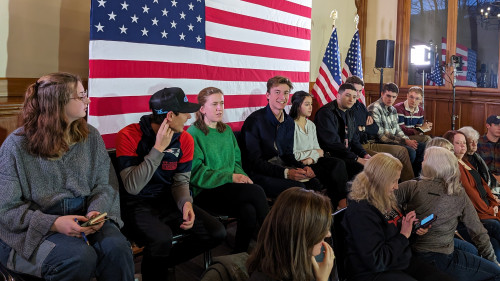
It appears that most Americans are not in favor of transgender sports bans, but legislatures in conservative states are passing them into law anyway. Why?
According to Daniel Lewis, Ph.D., and his colleagues, it may have more to do with conservative agenda setting than fairness or athletic achievement. Lewis, professor of political science and department chair at Siena, in partnership with political scientists at other universities, recently explored why legislators in various states have introduced 64 bills to ban transgender students from participating in athletics that match their gender identity. The number of statewide bans is now 18; four states currently restrict medical care for transgender youth.
Results and analysis of their May survey were recently featured in the Washington Post, and on the political science blog 3Streams. The Post also cited the study in an article about their own survey on athletics bans.
“The study we fielded set out to answer the question of whether trans bans in sports passed by Republican legislatures truly reflect public support,” said Lewis.
Lewis and his team specifically surveyed the amount of support for bans on trans girls in grades K-12. They found that 59 percent of Americans are opposed. Studies conducted by others, including the Post, focus on agreement with participation itself instead of the policy to ban participation, or examine specific genders or levels of competition, such as elementary and high school, college or professional.
“People are generally less supportive of bans for youth sports, but seemingly as the athletes get older and the level of competition ramps up, there is more concern about fairness, and people are more likely to support a ban.”
The team looked at Democrats versus Republicans and found that the latter are more likely to support some kind of ban. They also explored the possibility of compromise that would address balancing inclusion with fairness and safety, and found that Americans are generally opposed.
Why is the topic of transgender athletic competition getting so much public attention now? Lewis pointed to a couple primary reasons: a concerted effort by the Republicans to take a stand on this issue to generate some support for their party, now that same-sex marriage doesn’t get much traction and bathroom access received some public backlash.
“Sports raises a different set of issues,” said Lewis. “Competitive fairness seems to extend beyond being a conservative Christian concern. A lot of people from both ends of the political spectrum are interested in this.”
Another reason: some tangible, high-profile examples of trans athletes in competition. The most well-known case is that of University of Pennsylvania swimmer Lia Thomas, who recently became the first transgender athlete to win an NCAA Division I national championship.
Lewis, who co-authored the 2019 book The Remarkable Rise of Transgender Rights, said in this and other studies, respondents are still expressing uncertainty over the opinions and response.
“If you give people the option to respond ‘I don’t know’ or ‘I’m not sure’ they’ll take it.”
The Post survey found much more support for a ban in their survey just a few weeks apart from the survey conducted by Lewis’ team, and he said that most likely has to do with how a survey question is framed.
Going forward, those tracking this issue will want to note the nuances and complexities of compromises in proposed bans, such as requiring an amount of time to pass after an athlete starts hormone therapy before engaging in athletic competition with their newly-adopted gender. Another, as was the case in Utah, is whether a legislative ban is even needed, given that relatively few athletes in a jurisdiction would be impacted.
“In Utah, the legislature passed a ban and the Republican governor actually vetoed it because it would have affected only four kids,” he said. “Sports, particularly youth sports, have many benefits for kids, such as exercise and learning teamwork and leadership. These shouldn’t be denied to trans kids, who may be suffering from depression or mental illness at higher rate than the rest of the population. The benefit of inclusion in athletic competition would be especially helpful for them.”
Lewis also noted that over a relatively short period of time, public attitudes on transgender issues can change markedly.
“There is huge support now for allowing trans people to serve openly in the military, and that was heavily debated just five years ago.”

